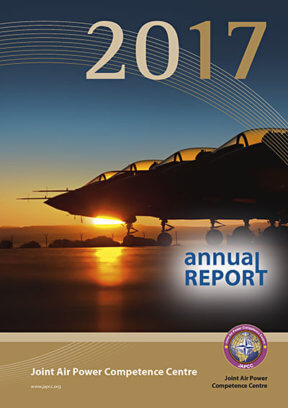Foreword
2017 has provided fresh insight into what the JAPCC can offer to the Alliance, and it has been eye-opening. The quality of personnel contributed by our Sponsoring Nations is superb and the scope of effective solutions offered by this organization has been outstanding. We are extremely fortunate to have such a centre of excellence available to assess and address the challenges facing our Alliance.
Today, we are confronted with myriad issues originating from every direction, including from within, that threaten the security of member nations. However, NATO is the most successful Alliance in modern history and has repeatedly shown its resilience over the last 68 years. While NATO has steadily adapted its approaches and structures to meet the demands of an evolving security environment, that environment is once again becoming more contested and a new strategic shift from assurance to deterrence is imperative.
It is in this context that the JAPCC has stepped into the gap to provide assistance across a wide range of Air and Space Power challenges. The JAPCC acts as a catalyst for the improvement of NATO’s Air and Space Power by providing insightful ideas and effective solutions to the Alliance.
For example, while it is important that Allies invest more in defence, it is also paramount that we invest efficiently in the right capabilities. The JAPCC has performed an important role in identifying capabilities the Alliance needs and by facilitating national, multi-national and collective capability development and innovation for the improvement of Joint Air and Space Power. These efforts, reflected in this annual report, influence various Bi-Strategic Command investment decisions and we are confident you will recognize the broad impact of our efforts.
The JAPCC’s efforts to train and educate the Alliance are paying big dividends, as well. Our specialists’ involvement in multiple Command-level exercises have enabled them to supply unique insight and expertise in a rapidly changing landscape of scenarios. The touch-points and influence of these accomplished subject matter experts are increasing at a tremendous rate, subsequently enabling a more skilled, effective fighting force that is able to execute and command and control operations in multiple domains.
The JAPCC is on the cutting edge of significant technology issues facing NATO, demonstrated by the Project Air Warfare in a Communications Networked Environment, which is proving to be a foundational work for future integration and command and control of legacy and 5th Generation systems, and the project NATO Joint Air Power and Offensive Cyber Operations, which looks at how NATO might leverage national capabilities to reinforce defensive Alliance measures. In addition, JAPCC led a SACT-sponsored study of shortfalls in NATO air and space capabilities and published the findings and recommendations under the title Joint Air Power Following the 2016 Warsaw Summit: Urgent Priorities. This important document identifies many low-cost and rapidly achievable solutions needed to ensure NATO air forces can continue to execute the Alliance’s three core tasks – collective defence, crisis management, and cooperative security.
In many ways we, as the Alliance, are in an enviable position with exceptionally trained and motivated Airmen and a strong reputation for readiness and resilience. We at the JAPCC are proud of the significant role we play in making this possible.
JAPCC’s Programme of Work continues to guide our efforts, which we are confident will continue to help Allied joint air forces adapt to our evolving environment. Over the following pages, this 2017 JAPCC Annual Report will highlight the key developments, projects and research shaping joint Air and Space Power. I encourage each of you to take a few short minutes to review this document, and to contact us with questions, feedback or requests for support at any time.
Good Reading!
General Tod D. Wolters
General, USA AF
Director, JAPCC









